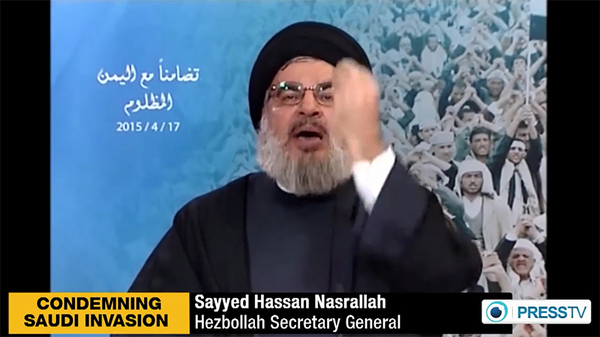Nasrallah’s speech reveals Iran’s shock over the Yemen crisis
Khairallah Khairallah/Al Arabiya
Friday, 24 April 2015
What are Hezbollah’s relations with Yemen and what’s the secret behind its interest in it? Is Iran being upset of Saudi policy in Yemen enough for Hezbollah to attack this policy following the Decisive Storm campaign? And it is enough for Hezbollah to just overlook the historical relation which connects Lebanon and the Lebanese people with the Saudi kingdom?
Hezbollah Secretary General Sayyid Hassan Nasrallah’s recent speech about Yemen did not include anything more than escalated rhetoric against Saudi Arabia. In brief, the speech attacked the Saudi kingdom more than previous speeches as Nasrallah focused on King Abdulaziz, who established the kingdom. He also emphasized attacking the Wahhabi sect on the basis that it’s in the core of the Islamic State of Iraq and Syria (ISIS) ideology.
This is not true at all, especially if we consider the hostility which the kingdom has towards all extremist organizations, mainly the Islamic State of Iraq and Syria (ISIS). Saudi Arabia is a partner in the war against ISIS and that’s how it’s always been – ever since the days of King Abdulaziz when it confronted all movements distinguished with extremism.
There’s one beneficial side to Nasrallah’s speech. The speech’s rhetoric reveals the extent of how upset Iran is. It rather exposes the Iranian shock as a result of the Decisive Storm which is led by Saudi Arabia in Yemen and in which there’s Arab, Muslim and international participation for a clear aim which is to once again resort to the political solution and to adopt dialogue amidst ordinary circumstances.
When I say ordinary circumstances, I mean circumstances in which no party linked to Iran imposes its conditions on others by resorting to the power of arms under the excuse of “revolutionary legitimacy.” The Saudi-led Decisive Storm campaign played the major role which the Yemeni government had requested of it: to curb Iranian activity in Yemen. This activity reached Aden and it could have reached the entire of the south after the Houthis gained the support of military powers loyal to former president Ali Abdullah Saleh.
Willing to make an initiative
What may have upset Iran a lot more is that Operation Decisive Storm, which is also the storm of Arab determination, showed that there’s an power which is willing to make an initiative instead of just observing Iran expand in all directions. It’s no longer possible to underestimate this power which is capable of carrying out 100 airstrikes a day.
Before Hezbollah voices its concern over Yemen and the Yemenis via its secretary general, why doesn’t it facilitate the process of electing a president in Lebanon?
Hassan Nasrallah expresses Iran’s discontent on two issues: the presence of such a power and the Arab awakening. Arabs were supposed to stay asleep for Nasrallah to feel satisfied and for the Iranian regime to impose its conditions on its Arab neighbors, from Bahrain to Iraq, Syria, Lebanon and Yemen. The Decisive Storm campaign showed that Arabs have the capability to resist and the desire to confront the Iranian expansion project. This is what made Nasrallah go really far in the campaign he launched against the Saudi kingdom in particular and against the Arab countries participating in the Decisive Storm campaign in general.
In the end and despite the relationship between his party and the Houthis – which is more than 15 years old – Hezbollah’s secretary general does not know much about Yemen and its complications. It’s no secret that the pro-Houthi satellite television channel al-Maseera broadcasts from a Hezbollah stronghold in Beirut. This is one thing and engaging in Yemeni details is another.
The Yemeni affair is still in the beginning but what Nasrallah and Iran fear is that Yemen may be the beginning of a certain phase and not at the end of a specific phase, as Tehran had hoped. They’re afraid it may be the beginning of a new Arab approach on how to deal with current crises in Iraq, Syria and Lebanon. In clearer words, Iran is afraid that the Arab stance may become different in Iraq, Syria and Lebanon.
What’s interesting is that while he was in Washington, Iraqi Prime Minister Haidar al-Abadi talked about Iraqi sovereignty and voiced criticism – though shyly – regarding the appearance of Iranian military commander Qassem Suleimani in photos revealing he was leading the battle in Tikrit. It’s true that time will reveal that Abadi is not any different than his predecessor Nouri al-Maliki but it’s also true that while he’s in the American capital, Abadi has to give the impression that he seeks the minimal amount of dependence with Iran and from its expansionist project based on sectarian instincts.
Daily slaughter
What’s also interesting is that the situation in Syria is changing on the ground in favor of the Syrian people whom Hezbollah, and its backer Iran, are slaughtering on a daily basis. Is the speech on Yemen an expression of the depth of the crisis which Hezbollah has found itself in, as a result of ignoring the Lebanese-Syrian borders and of getting involved in the war which the Syrian regime has launched against its people?
Last but not least, what’s interesting is that just as Nasrallah was finishing his speech, Lebanese Future Movement leader Saad Hariri was refuting all of its points and thus confirming that Lebanon refuses to be an Iranian colony and a tail of the “resistance axis.”
Hezbollah is trying to focus on more than Yemen. Yes, Yemen is important. One of the reasons it’s important is that Iran can use it to resume besieging the Saudi kingdom and the Arabian Peninsula, in addition to controlling navigation in the Red Sea.
What’s more than Yemen is the Arab decision not to surrender to Iran. This is what mainly explains the provocative rhetoric of Nasrallah who suddenly became concerned with minorities in the region!
Since when is Hezbollah concerned with minorities and Christians in Lebanon? Those who know what Christians have been through in west Beirut – displacement and harassment – in the phase after Hezbollah became involved in reviving the part of the city, will no longer wonder about the difference between the practices of these sectarian militias and the practices of ISIS and Sunni and Shiite militias targeting Christians in Iraq.
Some modesty is necessary now and then. Before Hezbollah voices its concern over Yemen and the Yemenis via its secretary general, why doesn’t it facilitate the process of electing a president in Lebanon? Is it because the president in Lebanon is a Christian and because he is the only Christian president in this region which extends from the Atlantic Ocean to beyond the Arabian Gulf – which Iran insists is Persian?



















